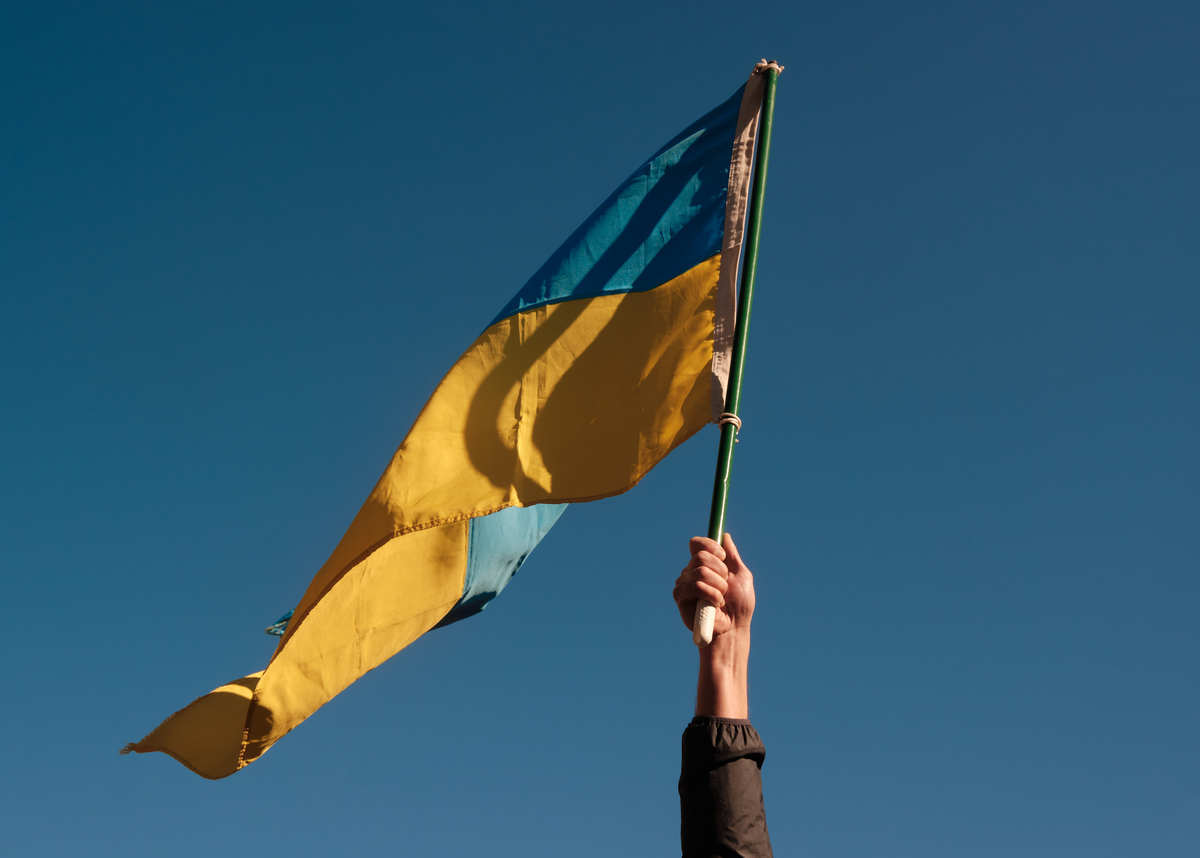Yalies rally behind Ukraine
This spring, Yale affiliates strongly condemned Putin’s invasion of Ukraine and offered an outpouring of support.

Lukas Flippo, Senior Photographer
Following Russia’s invasion of Ukraine on Feb. 24, New Haven and Yale communities came together to support Ukraine.
As professors offered perspective and even participated in diplomacy, Yale University officials widely condemned the Russian invasion of Ukraine. Yale students and New Haveners alike organized rallies in support of Ukraine and raised funds for humanitarian organizations helping Ukrainians. Some Yalies and New Haveners interviewed by the News described their personal connections to Ukraine and emotions amid the conflict.
“It’s my belief that, as socially conscious members of the world, it is our responsibility to do right in the face of the evils of war, authoritarianism, and empire,” Joaquín Lara Midkiff ’24, a member of the Yale College Council, wrote in an email to the News.
University Response
After the Feb. 24th invasion of Ukraine, University President Peter Salovey wrote in an email to students that he condemned the Russian invasion.
All University travel programs to Russia were deferred, though there were no plans to limit collaborations between Yale faculty and Russian academics. Salovey reported in March that one of the firms investing the University’s endowment had divested its Russian holdings, pulling millions of Yale dollars from Russian investments and cutting all of Yale’s financial ties to the country.
“The callous disregard for human life and ruthless destruction of Ukraine’s cities and towns are gross violations of international law and an assault on our common humanity,” Salovey wrote. “Vladimir Putin’s actions and his reckless threats of wider war are a risk to international peace and order. Yale condemns this unjustified and unprovoked attack.”
According to Vice President of Global Strategy Pericles Lewis, the Yale Office of Undergraduate Admissions looked to increase the number of Ukrainian students in the class of 2026. Two students from Ukraine Global Scholars, a college preparatory non-profit, were admitted to the Yale class of 2026, though it is unclear whether more Ukrainian students were accepted independent of Ukraine Global Scholars.
In interviews with the News, Yale professors contextualized the conflict. Professor of European intellectual history Marci Shore told the News that it is important to separate the ideals of Putin and his party from the ideals of the Russian people at large when considering the Russia-Ukraine conflict.
In March, Sterling Professor of international law Harold Hongju Koh represented Ukraine at the International Court of Justice in The Hague, arguing against Russia’s claim of rightful occupation.
“The whole world knows that that’s a lie,” Koh said. “If [Russia] thought they actually had a lawful basis to do this, they would appear and defend.”
Student Response
On campus, student organizations and student communities expressed their support for Ukraine through fundraisers and events.
Yale residential colleges hosted discussions on Ukraine and Eastern Europe, along with events to celebrate Ukrainian culture. Davenport College held discussions with “a bunch of faculty members who were fellows in the college, who had real expertise in and around Ukraine and Eastern Europe, geopolitical strategic questions and military history,” according to Davenport Head of College John Witt. At a Pierson College event organized by Grace Zdeblick ’22, students decorated pysanky, or traditional Ukrainian Easter eggs, while raising funds to benefit Razom, an organization that helps Ukraine from abroad. The Yale College Council raised over $2,000 for Razom in early March, as well.
The St. Thomas More Chapel held two “Vigil for Peace” concerts in March, with donations benefiting Polish organizations providing support for Ukraine.
In April, NoirUnited International, an organization founded by Yale School of Public Health student Nassim Ashford SPH ’23, helped raise $125,000 and helped minority students flee Ukraine.
“Much larger humanitarian organizations are not really … looking at the more marginalized communities of Ukraine, who are foreign nationals,” Ashford said. “So that is why we focused on Black students who were fleeing Ukraine … The biggest thing that we’re trying to do right now is fill this gap.”
Yale students with ties to Ukraine spoke to the News about their personal experience of the conflict.
“It’s honestly been absolute hell,” said Sofiya Bidochko ’24, whose entire extended family lives in Ukraine. “There is no feeling like trying to carry on with your life here when you don’t know if your family is going to be bombed. The air sirens are going off where my family’s at, and the government issued warnings that there could be attacks tonight. There’s just no way for me to want to study for a midterm when such a tragedy is going on.”
At a Sunday afternoon rally outside Sterling Memorial Library, the New Haven community protested the atrocities in Ukraine. Rallygoers emphasized the importance of supporting Ukraine from abroad, with New Haven Mayor Justin Elicker in attendance.
Local Ukrainians who spoke to the News emphasized the struggles of their friends and family facing violence back home.
“It’s really scary, but Ukrainians are really strong,” New Haven rallygoer Liena Kuchrerova said. “We’re not afraid. We have a hope and we believe we are not afraid at all. Nobody, even children, we’re not afraid.”
The Russian invasion of Ukraine violated article 2(4) of the United Nations charter.



